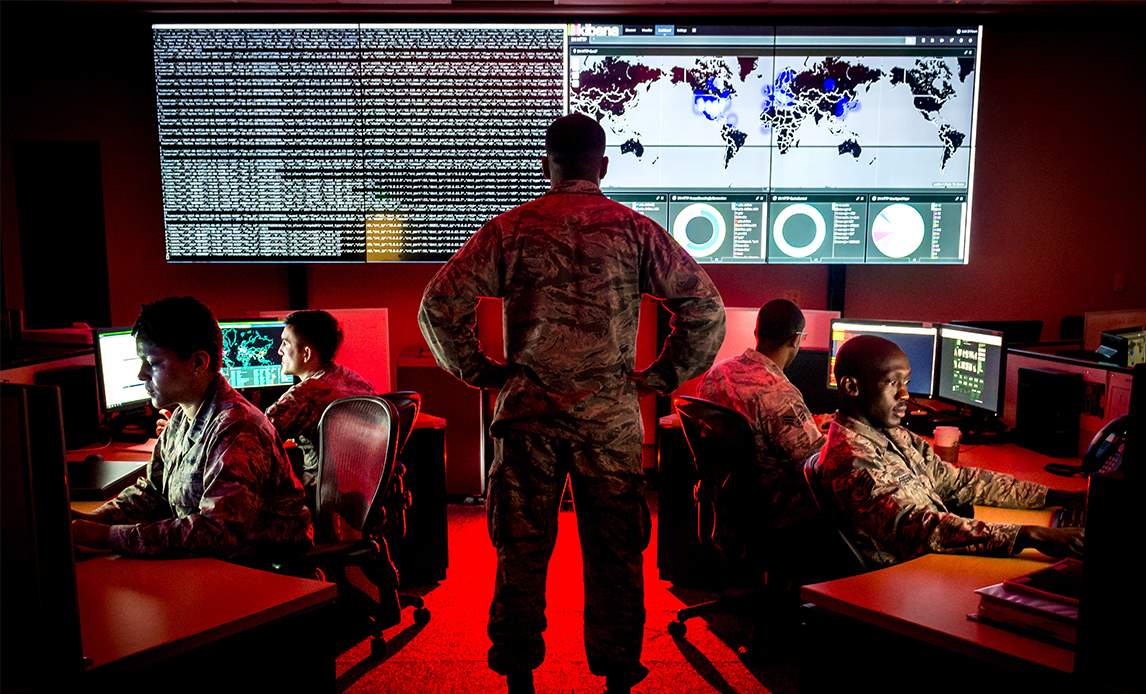This course provides officers who will serve in higher command staffs with an understanding of cyberspace as a domain for military operations. The purpose is to enable them to give relevant and timely guidance on the use of cyberspace and development of the Danish armed forces’ ability to fight in, through and by cyberspace.
The target audience for this module is officers from the armed forces at the level of NATO OF-2 (captain) and OF-3 (major).
Students enrolled in the Master of Military Studies (MMS) program have priority (tier 1 audience). Other employees within the Danish armed forces or other Danish governmental institutions will be accepted for participation as tier 2.
Civilian and military personnel from NATO and partner nations will be accepted for participation as tier 3.
Applicants must at least have completed an education at level 6 (e.g. bachelor degree) and be familiar with academic methodology prior to course start.
The course is taught in English. Participants must have good English skills (NATO 3-3-3-3 iaw. ATrainP-5). If no non-Danish speakers attend the course, then the will be conducted in Danish.
The course is mainly taught at the unclassified level. No security clearance is required for attendance. However, some discussions/presentations will include classified content (TJJ), which means that those without proper security clearance will have to step out of the room.
Officers graduating from this course can critically discuss the relevance of cyberspace for military operations and advice on needed changes to existing technologies, doctrines and organisational setups.
After graduation, the officer has the knowledge, skills and competences stated below.
KnowledgeThe student:
- Can account for the latest research-based approaches to and empirical cases and practices within the field of cyberspace operations and cyberwar.
- Can consistently use the correct terminology within the field of cyberspace operations and cyberwar.
SkillsThe student:
- Can independently seek relevant information about cyberspace operations and cyberwar.
- Can use and systematically cite relevant academic and non-academic sources.
- Can communicate an academic argument about cyberspace operations and cyberwar in a clear and correct English
- Can introduce and follow an academic structure of argumentation.
- Competencies
The student:
- Can introduce and motivate a concrete problem within the field of cyberspace operations and cyberwar.
- Can make a clear and loyal presentation of the theories/concepts/models, method and empirical cases most relevant to a given research question within the field of cyberspace operations and cyberwar.
- Can analyse a given problem based on concepts, theories or models.
- Can identify and discuss current limitations within the field of cyberspace operations and cyberwar and critically reflect and advice on possible and relevant improvements to existing knowledge, technologies, doctrines and/or organisational setups.
- Definitions and terminology.
- Strategic dilemmas in cyberspace.
- Military cyberspace operations.
- Laws and norms relevant to CO.
The course is organised as a blend of distance-learning and on-campus learning activities.
Internet access is required. Wifi is provided by the Royal Danish Defence College on-campus.
On average, participants shall expect to use:
- 7-10 hours weekly throughout the course on reading mandatory material and online learning activities (only in distance learning periods).
It is advisable to schedule this workload to deconflict with other activities.
The course spans a period of 16 weeks.
Date of access to the course e-learning platform: 21 august.
Note that access to the course site will expire after six years.
Course start: 23 August 2023.
Deadline Mandatory Assignment #1: 2 October 2023
Deadline Mandatory Assignment #2: 10 November 2023
Exam start: 21 November 2023
Course end (exam hand-in): 05 December 2023.
In-person period (week 41): 09 October to 13 October 2022.
Take-home assignment with approximately 14 days to write an eight-page paper.
The paper is graded using the Danish 7-point scale (ECTS-scale).
An external examiner is appointed.
Dress code during on-campus activities: Battle dress uniform (DNK “MTS”). Civilians wear casual attire.
Cyberspace Operations Officer and Liaison (COOL).
Cyber – Executive Development Graduate Experience (C-EDGE)
International Cyber Education (ICE).
TGR 900 – IT Sikkerhedsbrugerkursus.
